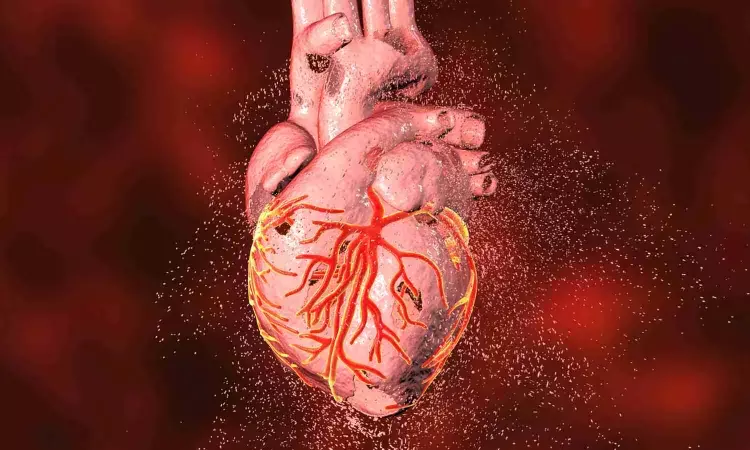- Home
- Medical news & Guidelines
- Anesthesiology
- Cardiology and CTVS
- Critical Care
- Dentistry
- Dermatology
- Diabetes and Endocrinology
- ENT
- Gastroenterology
- Medicine
- Nephrology
- Neurology
- Obstretics-Gynaecology
- Oncology
- Ophthalmology
- Orthopaedics
- Pediatrics-Neonatology
- Psychiatry
- Pulmonology
- Radiology
- Surgery
- Urology
- Laboratory Medicine
- Diet
- Nursing
- Paramedical
- Physiotherapy
- Health news
- Fact Check
- Bone Health Fact Check
- Brain Health Fact Check
- Cancer Related Fact Check
- Child Care Fact Check
- Dental and oral health fact check
- Diabetes and metabolic health fact check
- Diet and Nutrition Fact Check
- Eye and ENT Care Fact Check
- Fitness fact check
- Gut health fact check
- Heart health fact check
- Kidney health fact check
- Medical education fact check
- Men's health fact check
- Respiratory fact check
- Skin and hair care fact check
- Vaccine and Immunization fact check
- Women's health fact check
- AYUSH
- State News
- Andaman and Nicobar Islands
- Andhra Pradesh
- Arunachal Pradesh
- Assam
- Bihar
- Chandigarh
- Chattisgarh
- Dadra and Nagar Haveli
- Daman and Diu
- Delhi
- Goa
- Gujarat
- Haryana
- Himachal Pradesh
- Jammu & Kashmir
- Jharkhand
- Karnataka
- Kerala
- Ladakh
- Lakshadweep
- Madhya Pradesh
- Maharashtra
- Manipur
- Meghalaya
- Mizoram
- Nagaland
- Odisha
- Puducherry
- Punjab
- Rajasthan
- Sikkim
- Tamil Nadu
- Telangana
- Tripura
- Uttar Pradesh
- Uttrakhand
- West Bengal
- Medical Education
- Industry
Higher TyG Index Linked With Early-Onset ASCVD and All-Cause Mortality, claims study

Researchers have found that a higher triglyceride glucose (TyG) index is significantly associated with an increased risk of early-onset atherosclerotic cardiovascular disease (ASCVD) events. This risk also extends to all-cause mortality in young and middle-aged populations from North China. This study was published in Cardiovascular Diabetology by Qiqi H. and colleagues. The Kailuan Study, which followed 64,489 participants, demonstrates the importance of monitoring and managing the TyG index to reduce the risk of ASCVD and premature death in these age groups.
Early-onset ASCVD and all-cause mortality pose significant health risks to young and middle-aged populations. The TyG index, a marker of insulin resistance, may play a role in the development of ASCVD events and mortality. The Kailuan Study provides new insight into the relationship between the TyG index and these health risks.
The study included 64,489 young and middle-aged participants from the 2006 Kailuan Study physical examination. Multivariate Cox proportional hazards models and restricted cubic spline curves were used to assess the association between the TyG index and the risk of early-onset ASCVD events and all-cause mortality.
The key findings of the study were as follows:
• During a median follow-up period of 11 years:
• 1,984 participants (3.08%) experienced at least one ASCVD event.
• 1,392 participants (2.16%) experienced all-cause death.
• A higher TyG index was significantly associated with a higher risk of early-onset ASCVD events (HR: 1.61, 95% CI 1.38–1.89) and all-cause mortality (HR: 1.39, 95% CI 1.17–1.65).
• For each unit increase in the TyG index, the risk of early-onset ASCVD events increased by 20%.
• There was a non-linear association between the TyG index and early-onset ASCVD events (P for non-linear <0.01).
• A linear association between the TyG index and all-cause mortality was observed (P for non-linear = 0.476).
The study demonstrates a significant association between a higher TyG index and an increased risk of early-onset ASCVD events and all-cause mortality in a young and middle-aged population from North China. These findings emphasize the need for monitoring and managing the TyG index to reduce the risk of early-onset ASCVD and mortality.
Reference:
Hou, Q., Qi, Q., Han, Q., Yu, J., Wu, J., Yang, H., Chen, S., Wu, S., & Li, K. (2024). Association of the triglyceride-glucose index with early-onset atherosclerotic cardiovascular disease events and all-cause mortality: a prospective cohort study. Cardiovascular Diabetology, 23(1). https://doi.org/10.1186/s12933-024-02249-4
Dr Riya Dave has completed dentistry from Gujarat University in 2022. She is a dentist and accomplished medical and scientific writer known for her commitment to bridging the gap between clinical expertise and accessible healthcare information. She has been actively involved in writing blogs related to health and wellness.
Dr Kamal Kant Kohli-MBBS, DTCD- a chest specialist with more than 30 years of practice and a flair for writing clinical articles, Dr Kamal Kant Kohli joined Medical Dialogues as a Chief Editor of Medical News. Besides writing articles, as an editor, he proofreads and verifies all the medical content published on Medical Dialogues including those coming from journals, studies,medical conferences,guidelines etc. Email: drkohli@medicaldialogues.in. Contact no. 011-43720751


